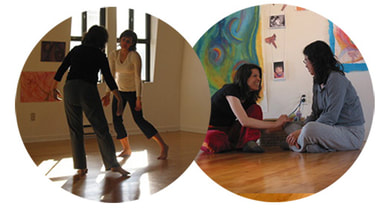History
History of Expressive Arts Therapy
The field of Expressive Arts Therapy (EXA) was founded in the early 1970’s by Shaun McNiff, Paolo Knill and others at Lesley University Graduate School in Cambridge, MA. It emphasized an interdisciplinary or “intermodal” approach to the use of the arts for healing, based on an established psychological framework. This in contrast to the specialized arts therapies, which often restrict practice to one artistic discipline.
From the start, the Lesley University program put the arts at the centre, searching for theories that come from the practice of art-making, what was called “theory indigenous to art.” In this way, Expressive Arts Therapy placed itself in a long tradition – the arts have always been used for purposes of celebration and healing, whether in a religious, cultural and psychotherapeutic context. EXAT emphasizes the experience of art-making as it contributes to the experience of the client in an effective way. The role of the therapist or “companion” is to help the client go through a process of play and art-making that will give them a sense of aliveness and open up new possibilities for self-development.
From the start, the Lesley University program put the arts at the centre, searching for theories that come from the practice of art-making, what was called “theory indigenous to art.” In this way, Expressive Arts Therapy placed itself in a long tradition – the arts have always been used for purposes of celebration and healing, whether in a religious, cultural and psychotherapeutic context. EXAT emphasizes the experience of art-making as it contributes to the experience of the client in an effective way. The role of the therapist or “companion” is to help the client go through a process of play and art-making that will give them a sense of aliveness and open up new possibilities for self-development.
Philosophy of Expressive Arts Therapy
EXAT is based on what we call poiesis, the Greek word for making or shaping. Human beings do not come into an environment to which they are pre-adapted; rather they shape the world around them to fit their needs. This shaping can be creative or destructive. EXAT aims to help clients find creative ways of shaping their particular environment so that it can become a home for them, a place in which they can realize their potential. Creative self-development in relation to others is key to growth; in EXAT we train to build therapeutic relationships in which clients can feel both supported and challenged.
 Art-in-Relationship is our motto.
Art-in-Relationship is our motto.
As Expressive Arts Therapy developed, its theoretical basis became more clear. Paolo Knill developed the theory of intermodality, in which he clarified the use of the different sensory modalities and artistic disciplines in therapeutic practice. In order to facilitate the full range of clients’ expressive possibilities, the therapist must be comfortable with a multiplicity of modes of artistic expression. This does not mean that they must be formally trained in all the arts; rather, we speak of a “low-skill, high-sensitivity” approach: therapists must cultivate their sensitivity to all modes of expression, both verbal and non-verbal. This approach is client-centered and resource-oriented which helps clients find meaning and direction with the difficulties that they initially presented.
History of The CREATE Institute
(formerly ISIS Canada -International School of Interdisciplinary Studies, Creative Integrative Arts Therapies Training Program)
In the mid-nineties, Paolo Knill left Lesley and returned to Switzerland to found, together with Ellen and Stephen Levine, The European Graduate School (www.expressivearts.egs.edu), with MA and PhD programs in Expressive Arts Therapy. ISIS Canada - International School of Interdisciplinary Studies was founded in 1991 by Ellen and Stephen Levine, together with Fran Harwood, as a free-standing training institute affiliated with EGS.
CREATE has trained expressive arts therapists in Toronto for over twenty years. Our graduates have gone on to work in agencies and clinics, as well as in private practice.
CREATE has trained expressive arts therapists in Toronto for over twenty years. Our graduates have gone on to work in agencies and clinics, as well as in private practice.
Philosophy of CREATE
Becoming a therapist is itself a creative process that requires the use of all our capacities. Only then can we find the resources we have to meet the needs of our clients. The ability to be in relationship with others, staying highly sensitive to their particular way of being in the world is key.
We emphasize both creativity and relationship At CREATE Institute we train students to acquire not only the skills that they need but also the self-development that is necessary to become a good therapist. Through the combination of class-work, readings, practicum experience, practice therapy sessions, studio work and personal therapy, students go through an intensive educational process that provide a solid basis for psychotherapeutic work. We are proud of the school we have shaped in Toronto, and continue to develop in ways that will work for students, clients and fit our changing world.